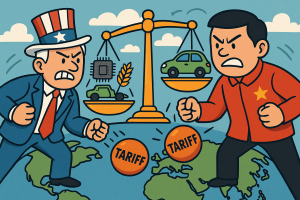Economic Strategy: The New War of the Modern Age

By : Dr. Abdul Wadud Nafis, LC., M.E.I.
In today’s increasingly interconnected world, we are living in an era where economic power has surpassed military might. Global conflicts are no longer measured by battles on the battlefield, but rather by market dominance, technological control, and sophisticated economic strategies. Major powers now prefer to assert their influence through trade policies, investment strategies, and sanctions instead of weaponry. In this era, economic warfare has become a more potent tool for determining the fate of nations, generating new tensions, and shaping a constantly evolving global order. This reality demands that we become smarter, more adaptive, and wiser in facing the challenges of our time.
The statement, “Modern wars are economic, not military,” is highly relevant in today’s global context. The world has experienced a paradigm shift—from military confrontation to economic dominance as the primary form of power and influence. Below are several key elaborations on this transformation:
1. Global Control Through Economics
Powerful nations like the United States, China, and the European Union utilize their economic strength to pressure or influence other countries through sanctions, embargoes, investments, and foreign debt.
2. Trade and Technology Wars
Rivalries such as that between the U.S. and China in the fields of technology—such as semiconductors and artificial intelligence—represent a new form of “cold war” rooted in economics.
3. Economics as a Tool of Diplomacy
Modern diplomacy increasingly relies on economic aid, investment cooperation, and free trade as means of forging alliances and easing conflicts.
4. National Resilience Shifting Toward Economic Resilience
A strong nation is now defined by its independent and resilient economy, not merely by its military capabilities.
5. Corporations as the ‘New Soldiers’
Multinational corporations have become “troops” infiltrating nations through products, consumer culture, and political influence.
Conclusion
In this ever-evolving world, the role of economics in shaping the future has become increasingly inevitable. Military wars may have become relics of the past, but today, true power lies in the control of resources, innovation, and economic policy. Therefore, we must prepare to face global challenges with smarter, more collaborative, and adaptive strategies in order to compete in an intensifying economic war.
References
1. Nye, J. S. (2004). Soft Power: The Means to Success in World Politics. PublicAffairs.
2. Keohane, R. O., & Nye, J. S. (2012). Power and Interdependence: World Politics in Transition. Pearson.
3. Stiglitz, J. E. (2003). Globalization and its Discontents. W.W. Norton & Company.
4. Piketty, T. (2014). Capital in the Twenty-First Century. Harvard University Press.
5. Mearsheimer, J. J. (2014). The Tragedy of Great Power Politics. W.W. Norton & Company.
6. Ferguson, N. (2008). The Ascent of Money: A Financial History of the World. Penguin Press.
7. Bhagwati, J. (2004). In Defense of Globalization. Oxford University Press.
8. Robinson, W. I. (2004). A Theory of Global Capitalism: Production, Class, and State in a Transnational World. Johns Hopkins University Press.

